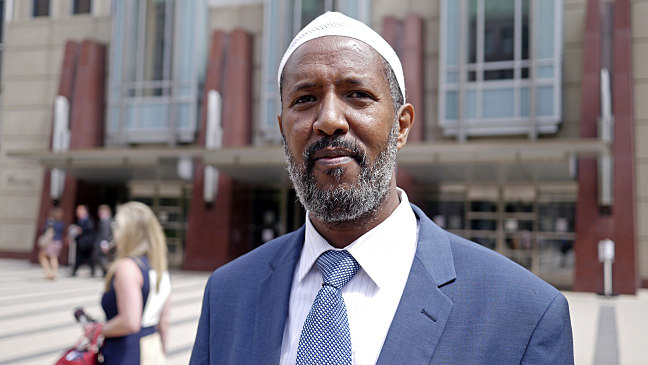A federal judge Wednesday turned down requests to let three Minnesota men accused of trying to join the ISIS terror group live under supervised release and out of jail while awaiting trial.

Davis also turned down supervised release for Zacharia Abdurahman and Hanad Musse, both 19.
The judge, however, indicated he was prepared to take a closer look at the release plans of all three men following court hearings in September.
Lawyers for the men had proposed allowing Somali-American community leaders to supervise the suspects and help them reintegrate into the community.
Before their arrests, the suspects were living with their families, enrolled in school and attending mosques, and some were employed, the attorneys argued.
Prosecutors, however, countered that the proposed release plans did nothing to guarantee the men wouldn't flee to Syria to join ISIS.
Jon Hopeman, Abdurahman's attorney, said on Wednesday that his client had community support, including a local mosque whose imam has preached against extremism since the Sept. 11, 2001 terror attacks.
He said Abdurahman was ready to quit his travel plans to Syria shortly before he was arrested.
Counterterrorism experts have been closely following the developments in Minneapolis because the United States typically doesn't offer rehabilitation programs to accused terrorists.
Davis has expressed interest in looking at less restrictive conditions for the suspects as part of a test to see if radicalized Americans can be pulled back from the call of terror and returned to their communities.
In January, Davis allowed terror suspect Abdullahi Yusuf to be placed in an experimental program where Yusuf received counseling and civic education classes through Heartland Democracy, a Minneapolis nonprofit.
Yusuf, however, was ordered back to jail in April after a utility knife was found under his bed. Yusuf said he knew nothing about the knife.
Andrew Birrell, Musse's attorney, said the Somali community is "emotionally involved" in his client's case.
"He's like my kids. He eats McDonald's and plays video games," he said of Musse. "He's an American through and through. He's not the enemy."

"The fact that he's careful and methodological, I think that's important," said Adam, who leads Dar Al-Hijrah Mosque in Minneapolis. "I think that gives us the opportunity to build the case and make it stronger that this is a united effort."
Adam said this is a difficult process that needs the involvement of the community, the government and the families.
"I've a vested interest in the future of our young people," he said, adding that he'd do whatever he could "to give the young people a chance and to show them we care about them."
Adam said he's met with each of the young men in the Sherburne County Jail and they are anxious to return to their families to spend the upcoming Muslim holiday of Eid al-Fitr with them.
Imam Hassan Mohamud of Minnesota Da'wah Institute in St. Paul, said the Sherburne jail has denied him and other imams access to the men.
He said he believes that's because the imams criticized a federal program launched by Minnesota U.S. Attorney Andy Luger intended to combat homegrown extremism.
Some members of the Somali community have argued the program is a guise to allow government spying on Somali-Americans.
The jail provided a statement it said was sent to Mohamud indicating that "something" came up in Mohamud's background that disqualified him from "entrance into the facility as a professional visitor."
Adam said he visited all three men at the jail and does not think they are a danger to the community.
"I did not see any anger in them, I didn't see any dislike of this country," Adam said. "They are not hardcore criminals."
No comments:
Post a Comment